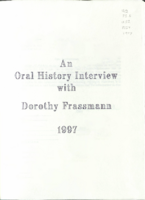Search the Special Collections and Archives Portal
Search Results

Transcript of interview with Steve Riback by Barbara Tabach, December 12, 2017
Date
Archival Collection
Description
Sgt. Steve Riback is a Detective Sergeant for the Las Vegas Metropolitan Police Department. He has been with the police force for nearly twenty years. On the night of the Route 91 Harvest festival shooting, he had just returned home shortly after 10pm. He had been on an overtime assignment at the Golden Knights hockey game at the T-Mobile prior to the shooting. When he was abruptly awaken by a call from his lieutenant, he was oblivious to the time and immediately rushed into action—contacted his squad members and sped to his station in northwest part of the city. He reflects on his overwhelming pride of the police that day, recalling what he heard on his police radio, seeing the rush of police cars being dispatched, and watching a body camera video later. Sgt. Riback’s squad was assigned to Spring Valley Hospital where they worked tirelessly to identify victims, both injured and deceased. His reflections stir the image of medical professionals and police officers urgently fusing together to handle the situation at hand. Riback shares a myriad of emotions, talks about the options available for officers to deal with their personal trauma, and how he explained to his eight-year-old why Daddy was crying. Riback is also known as the Kosher Cop and has authored a book, My Journey Home, about becoming an observant Orthodox Jewish officer and his struggle for the right to wear his beard and a yarmulke while on duty.
Text

Transcript of interview with Harry Kogan by Barbara Tabach, January 12, 2016
Date
Archival Collection
Description
With a liveliness of a man decades younger, Harry Kogan looks at his 100th birthday with cheer and satisfaction. Born March 11, 1916 to poor Russian immigrant parents in the Jewish ghetto of Philadelphia, Harry vividly recalls walking to school shoeless, with no hat or no raincoat. A treat would be his mother handing him ten-cents to go to the theater and enjoy a silent movie. After graduating from high school in 1933, Harry quickly took one of the rare jobs available in a garment manufacturing company where he worked his way into being a skilled and valued fabric cutter-a job that paid $35 a week. Harry was raised with two brothers and lived in Philadelphia for the first 91 years of his life before moving to Las Vegas. One of his brothers learned the refrigeration business while enlisted in the Navy and after the war formed a commercial refrigeration business named Kogan Brothers. Harry is a philosophical and philanthropic man. He was slow to retire and traveled the world, took classes and donated to his favorite causes; among which are the Boys Town Jerusalem and the Jewish Federation of Las Vegas. He sat for this interview to honor his Jewish roots, to share his life experiences and spending the past years in Las Vegas.
Text

Transcript of interview with Jacqueline Baskow by Barbara Tabach, October 24, 2016
Date
Archival Collection
Description
In 1976, Jacqueline "Jaki" Baskow was an aspiring actress when she and a friend accepted an invitation to worked in a movie studio in Las Vegas. She had three-hundred dollars to her name, a dream and lots of dynamic energy. Though the movie studio offer did not quite materialized as she hoped - the invitation had come from Batman co-creator Bob Kane - Jaki's trajectory into Las Vegas, working with talents and planning events became an over forty year career. In this interview, she talks about growing up Jewish in Camden, New Jersey where her father was a murder victim; her tenacious effort to find the perpetrator included the help of celebrity detective Joe Schillaci. She shares stories of the colorful array of A-list entertainers she has worked with to build her successful business, Baskow and Associates. She has built a niche of handling large corporate events, hiring talent and attention to details for exciting events. She reflects on the people and moments that impelled her on; mentors such as Bobby Morris and Frank Sinatra and Jilly Rizzo.
Text

Transcript of interview with Bert Hood by Dennis McBride, June 16, 1998
Date
Archival Collection
Description
Bert Hood is celebrated in Las Vegas's gay history for his ownership of the Red Barn, one of our most famous gay bars. This is another of those serendipitous interviews I've conducted with someone I very much wanted to interview but didn't know how to find. Bert's in Las Vegas from Oklahoma City for just a short while visiting old friends, and I was lucky enough to have found him through Bill Schafer, president of the Southern Nevada Gay and Lesbian Historical Society. I want to thank you, Bert, for donating these two hours of your vacation time to me so I can preserve your stories for the gay community.
Text

Transcript of interview with Dorothy Frassmann by Dennis McBride, September 21, 1997
Date
Archival Collection
Description
Born in Brooklyn, New York on October 29, 1931, Dorothy Frassmann talks about her life and experiences.
Text

Michael Green oral history interview: transcript
Date
Archival Collection
Description
Oral history interviews with Michael Green conducted by Barbara Tabach on February 26, 2018 and April 04, 2018 for the Southern Nevada Jewish Heritage Project. In the first interview, Green discusses his family background and growing up in Las Vegas, Nevada. He talks about his Jewish ancestry and the significance of religious communities in Las Vegas. In the second interview, Green discusses the growth of the Jewish community in Las Vegas, and the history of the Jewish heritage in Southern Nevada.
Text

Transcript of interview with Irwin Kishner by Claytee D. White, September 10, 2013
Date
Archival Collection
Description
Irwin Kishner (1933 ? 2017) was a noted real estate developer, attorney and longtime community leader. In this oral history interview conducted in 2013, he briefly shares his childhood growing up Jewish in Brighton Beach area of Brooklyn, New York. He often speaks of himself in the third person, as he brings to life his roots, his family?s move to Miami where he graduated from high school and the tale of his relocation to Las Vegas to work with his uncles Herman and Maury Kishner. He describes his entrance to Las Vegas as that of a bon vivant. And truly, Irwin, fell in love with the city from the moment he arrived in 1960. Irwin was a graduate of University of Florida (1954) and University of Miami Law School (1958). Both his daughters, Sharon and Joanna, were born in Las Vegas and he reminisces about becoming a Jewish bachelor father to them. In June 2013, shortly before this interview, Irwin celebrated his 80th birthday. He was a proud father, grandfather and energetic businessman who left an indelible mark on everyone he knew. As a developer, he was known for the Somerset Apartments, Somerset House Motel, Somerset Gardens apartment complex, and the Somerset Shopping Center. He enjoyed reflecting on the many community organizations he dedicated himself to, from the Las Vegas Convention and Visitors Authority to Opportunity Village to the original Las Vegas Rotary Club to the Community Concert Association?and that?s just to mention a few.
Text

Transcript of interview with Doris, Gerald and Marcy Welt by Barbara Tabach, November 30, 2014
Date
Archival Collection
Description
Interview with Doris, Gerald "Jerry", and Marcy Welt by Barbara Tabach on November 30, 2014. In this interview, the Welts discuss how they came to Las Vegas in the early 1970s from California, and Eli Welt's pawnshop, Stoney's, which he acquired from Doris's father, Jerry Fox. Jerry and Marcy talk about how they met and came to Las Vegas, where Jerry worked for Harry Reid's law firm. They talk about the community that existed in Las Vegas at the time, and their involvement with B'nai B'rith.
Just before the start of the Great Depression, Doris Fox was born in Detroit, Michigan. At the age of fifteen, she met Eli Welt, and the two were married three years later in Alexandria, Louisiana, where Eli was stationed with the United States Army Air Corps. Eventually, Doris and Eli moved to southern California with their three children-Gerald (aka Jerry), Richard (aka Rick) and Susan (aka Sue). In 1971, after all their children were out of the house, Doris and Eli moved to Las Vegas. They followed Doris' father, Jerry "Stoney" Fox, who had moved to the city in the 1940s, and was one of the first entrants into the local pawnshop industry. Like many migrants to the city, Eli became active in the Jewish community, particularly with B'nai Brith and Jewish Family Service Agency. Doris and Eli's eldest son, Jerry, and wife, Marcy, moved to Las Vegas in 1972 with their two small children. Tiffany and Cory. Jerry and Marcy had met through a Jewish youth group as teenagers in Anaheim, California. Having just finished law school, Jerry found that legal career opportunities were plentiful in the growing city. His first job was as a law clerk with Harry Reid's law office, Beckley, DeLanoy, Jemison and Reid, later becoming an associate attorney. He assisted Reid as lieutenant governor and on his early political campaigns. Jerry left Beckley, DeLanoy, Jemison and Reid to work for Oscar Goodman's firm-Goodman, Snyder and Gang-focusing on civil litigation. In 1975, Jerry opened his own practice, continuing to specialize in civil ligation, and served as general counsel to Las Vegas Clark County Library District. Since their arrival, Marcy and Jerry have been dedicated to community service, particularly within the Jewish community. Both were active in youth programs at Temple Beth Sholom, Jerry even serving as youth commissioner and later, education director. Marcy worked with Edythe Katz at the Holocaust Resource Center and assisted with producing a film and training program for educators. Both are avid supporters of youth travel to Israel and work hard to ensure these opportunities continue to be available for those interested.
Text

Interview with Kenneth Giles, February 10, 2005
Date
Archival Collection
Description
Text
Audio recording clip of interview with Kenneth Giles by Suzanne Becker, February 10, 2005
Date
Archival Collection
Description
Sound
